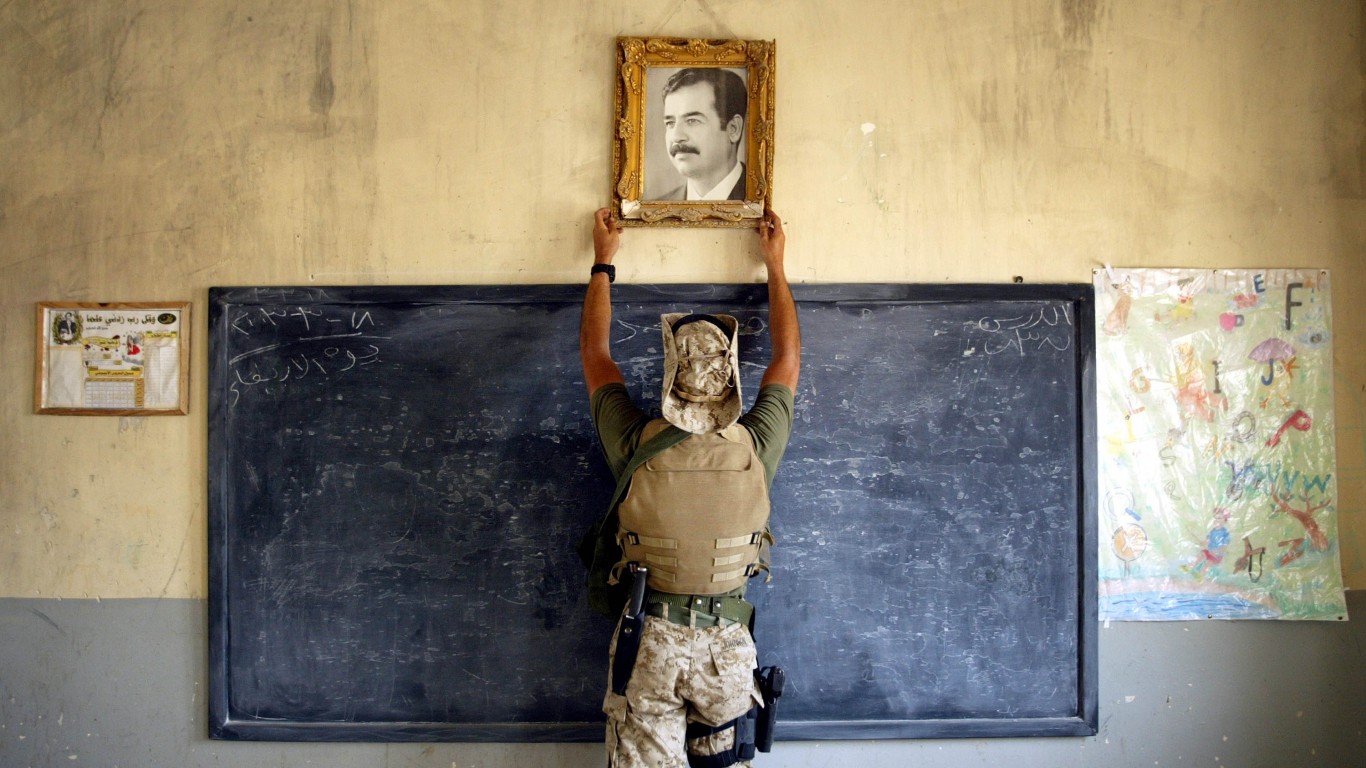
The Iraq War, waged by the U.S. and several allies against the government of Saddam Hussein and then Fedayeen insurgent groups and other Middle Eastern militant forces between 2003 and 2011, was a war that never should have been.
In 2002, with our nation still reeling from the effects of the devastating al-Qaeda attacks on American soil on Sept. 11, 2001, the George W. Bush administration successfully sought congressional approval to launch a military attack on Iraq.
The rationale for the invasion of this far-off Middle Eastern country, which began on March 20, 2003, was twofold: that Iraqi dictator Saddam Hussein had supported al-Qaeda, perhaps aiding in the Sept. 11 attacks, and that he was stockpiling so-called WMDs – weapons of mass destruction, including nuclear and chemical weapons. (Here’s a chilling look at the world’s most dangerous chemical weapons.)
Both claims were soon proven to be false, but by that time the war was well underway, with coalition forces on the ground. (There was also speculation, which Bush strenuously denied, that he had targeted Hussein to impress his father after Hussein’s earlier invasion of Kuwait or to get revenge for a supposed Iraqi plot to assassinate the elder Bush.)
Though Bush famously (and fatuously) declared “Mission accomplished!” on an aircraft carrier in California in May 2003, U.S. involvement in Iraq was just beginning. A vigorous insurgency was mounted, including members of Hussein’s Ba’athist party as well as various paramilitary Fedayeen groups. Hussein was captured in December of that year and executed three years later – but meanwhile the insurgency grew, drawing forces from elsewhere in the Middle East, including (finally) al-Qaeda and other militant Islamic groups, and Iraq devolved into civil war.
Presumably realizing that American attempts to rebuild Iraq had failed utterly, and widely criticized for his adventure’s costs both in human lives and financially (a Harvard University study pegged the true cost of the war at more than $3 trillion), Bush agreed in 2008 to withdraw U.S. troops from the country – though the withdrawal wasn’t completed until late 2011 under President Barack Obama.
By that time, an estimated 4,500 American troops and almost 18,000 pro-American Iraqi forces had lost their lives in the conflict, as did more than 70,000 pro-Hussein combatants and insurgents and well over 100,000 civilians, and much of the country was left in ruins. While most analysts agree that the U.S. didn’t exactly lose the war, it is generally agreed that the invasion accomplished nothing of substance. (Here’s how every war in U.S. history ended.)
Click here to see horrifying images of the Iraqi War.
At every stage of the Iraqi debacle, war photographers were on the ground (and sometimes in the air), documenting the alternately poignant, depressing, and often horrifying face of the conflict. To assemble an album of dramatic images of the Iraq War, 24/7 Tempo combed through the archives of Getty Images and Wikimedia Commons. Information on the war itself comes from sources including the New York Times, the Council on Foreign Relations, and Britannica.
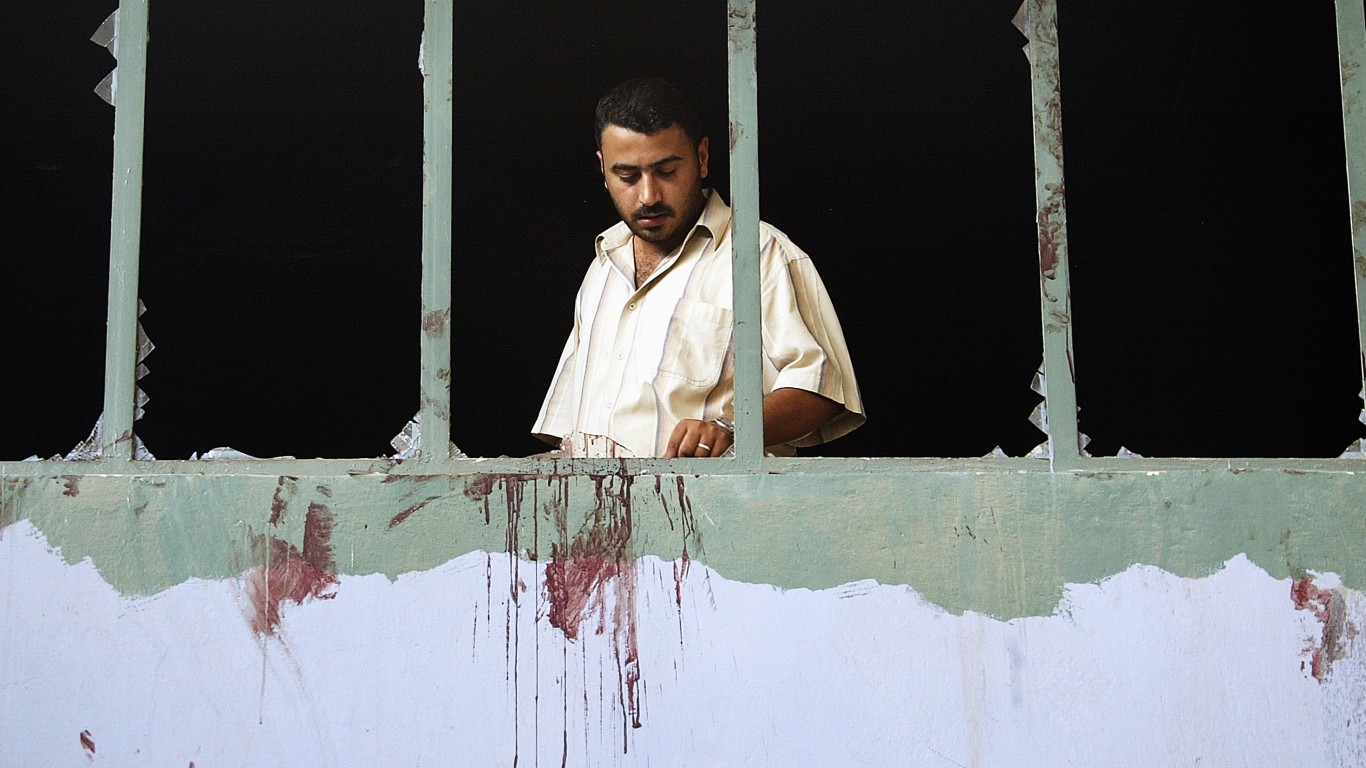
Blood on the wall
A man looks at streams of blood beneath blown-out windows following a car bomb attack on the offices of al-Sabah, the official Iraqi newspaper, founded after the arrest of Saddam Hussein.
[in-text-ad]
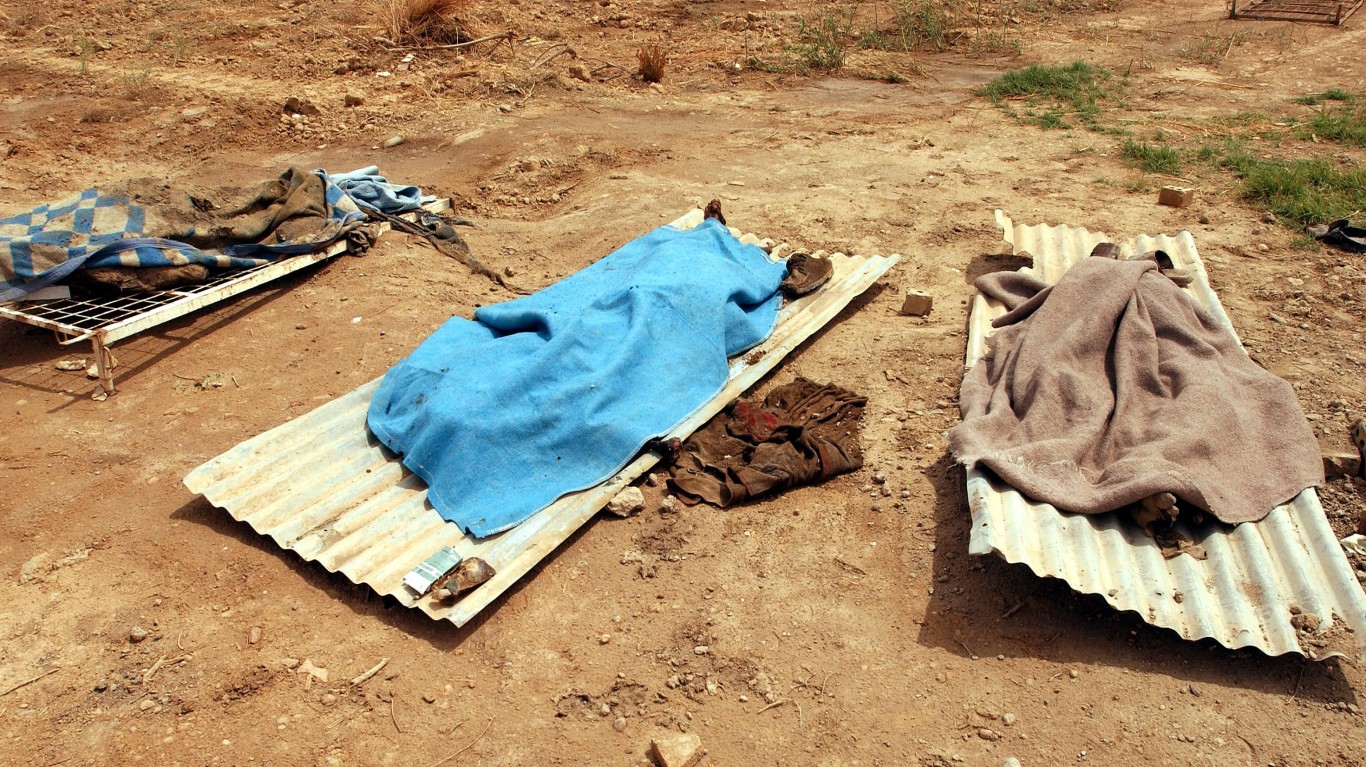
Slain prisoners
The bodies of slain prisoners outside the infamous Abu Ghraib prison in Baghdad, discovered by coalition forces shortly after the invasion.
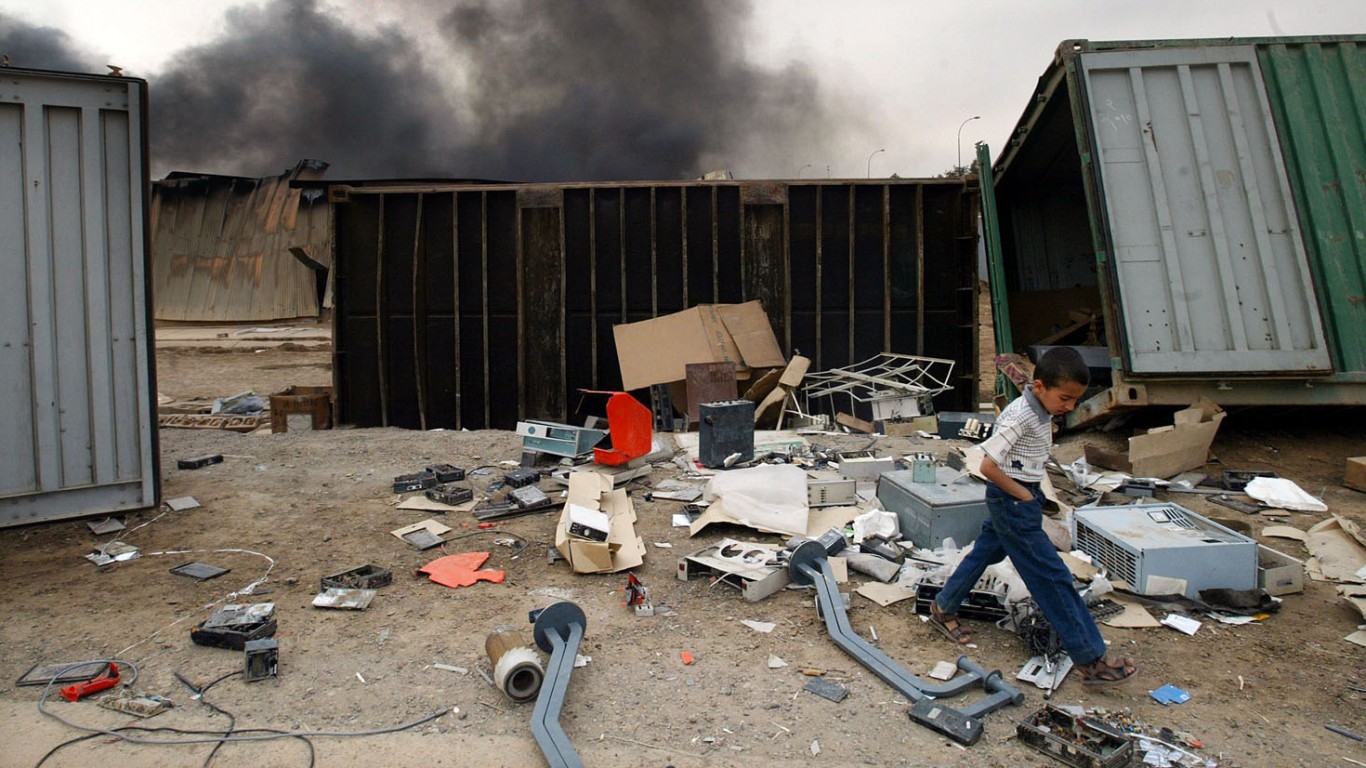
Rampant looting
A boy walks past a destroyed warehouse, looted by Iraqis a month after the invasion.
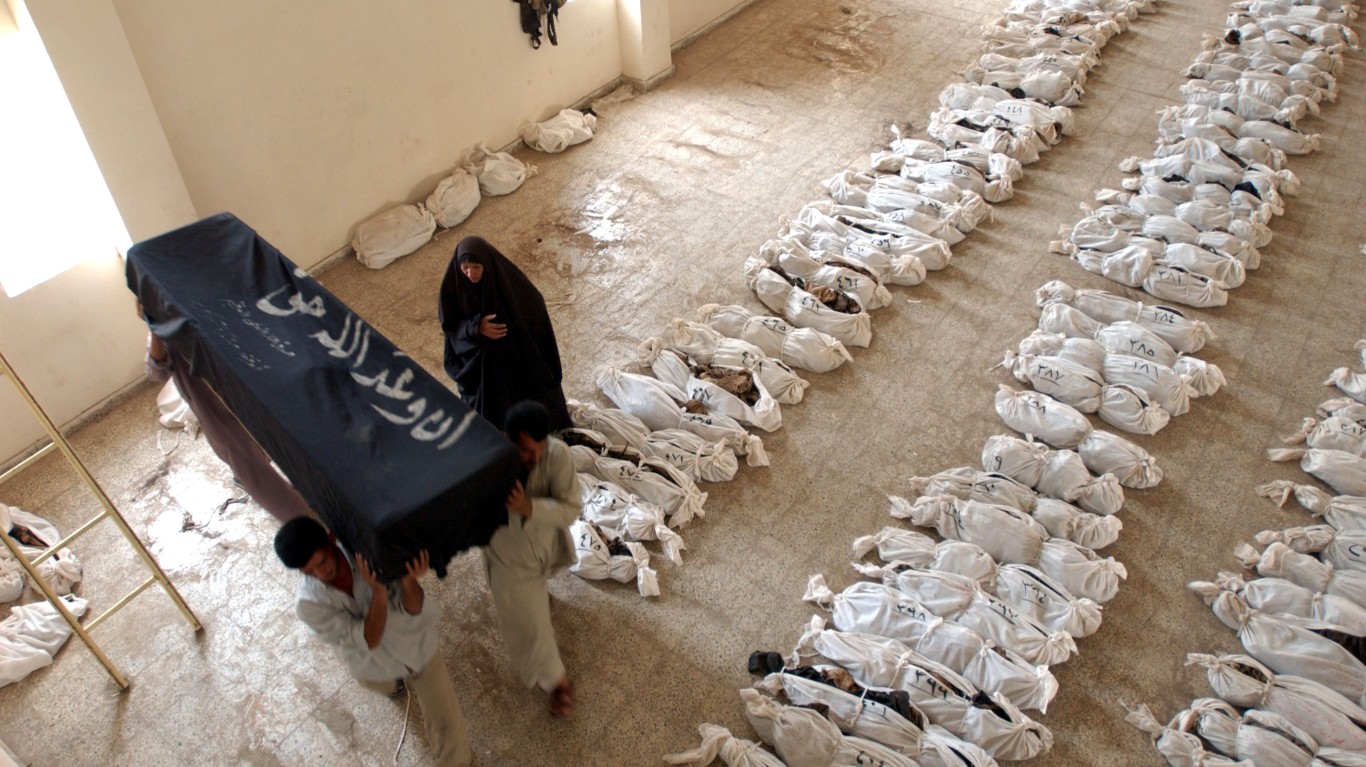
Identifying bodies
Bodies of Shi’ite Muslims executed by Hussein’s regime after the first Gulf War, discovered in a mass grave outside Al Musayyib, south of Baghdad, two months after coalition forces arrived, and now waiting to be identified by their families.
[in-text-ad-2]
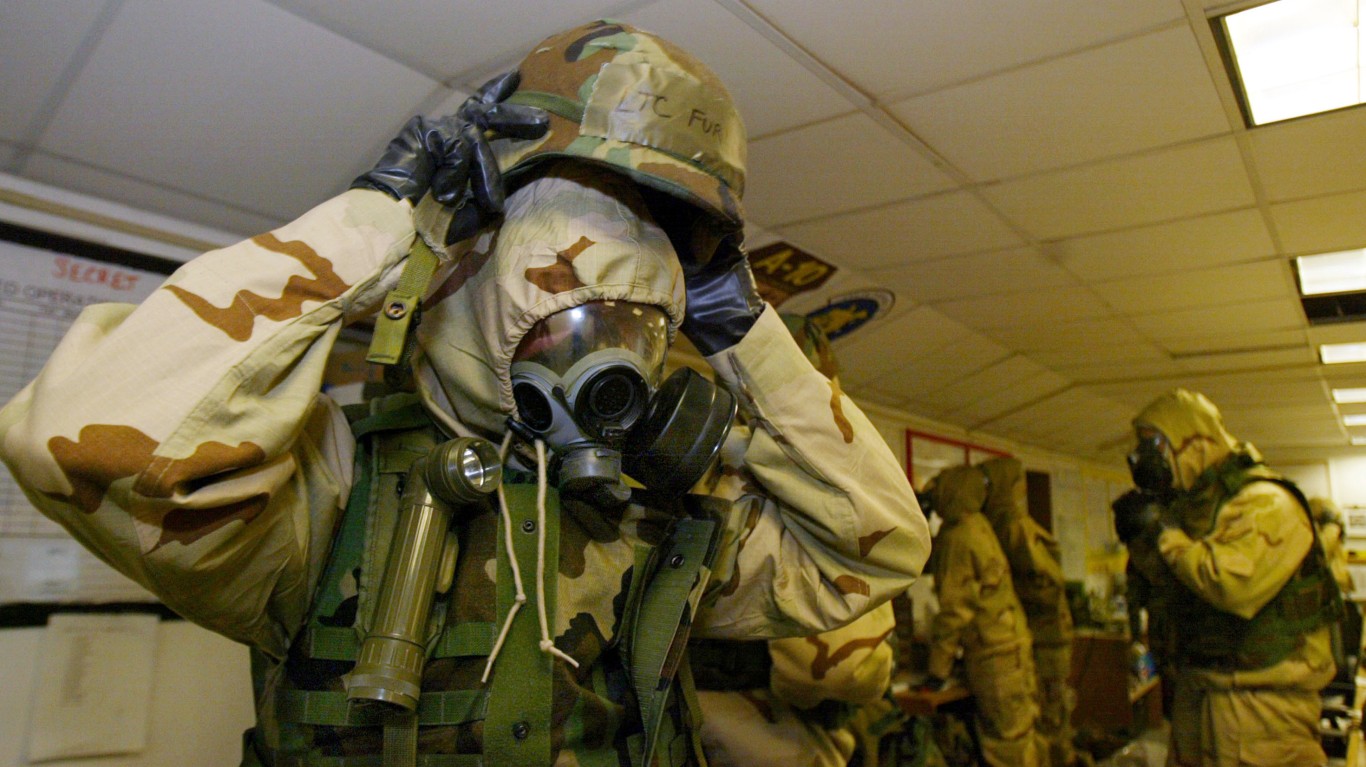
On the way to fight
U.S. Air Force personnel don gas masks at an unnamed Persian Gulf airbase before taking off for Iraq.
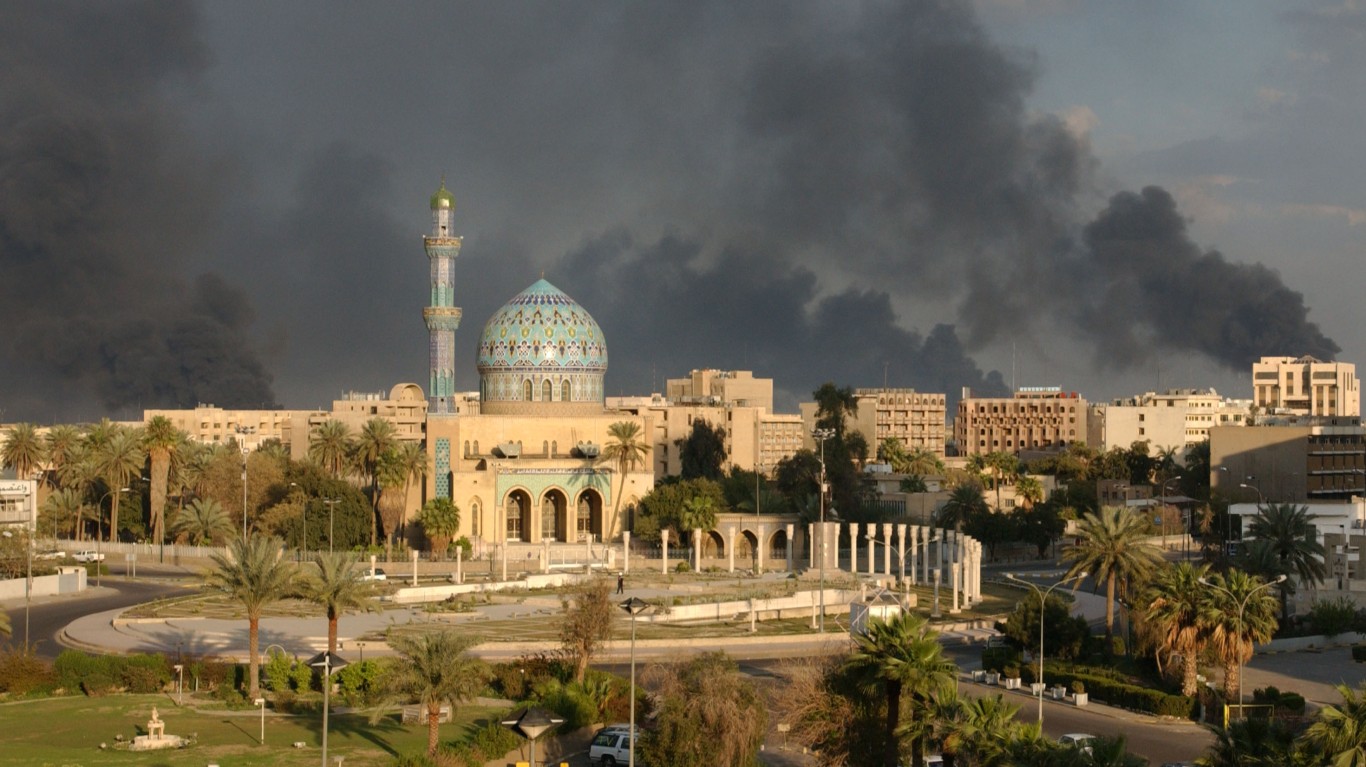
Burning oil
Smoke rises from oil burning in trenches on the edge of Baghdad following a U.S. missile strike.
[in-text-ad]

Evacuating a comrade
Marines from Task Force Tarawa, an air-ground brigade, carrying a wounded comrade to safety after a gun battle in Nasiriyah, in southern Iraq.
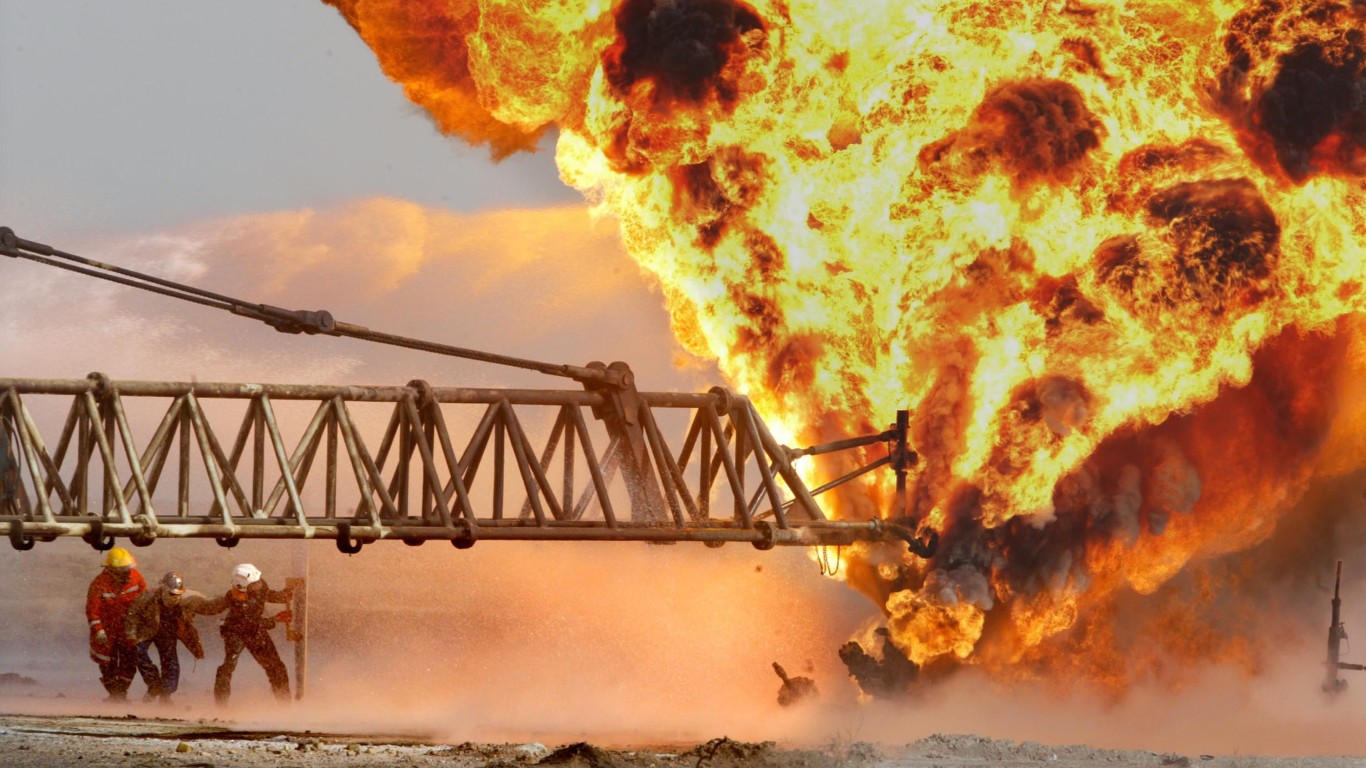
Fighting the fire
Workers from the Kuwait Oil Company attempt to extinguish a fierce oil well fire in the massive Rumaila oil fields near the Kuwaiti border.
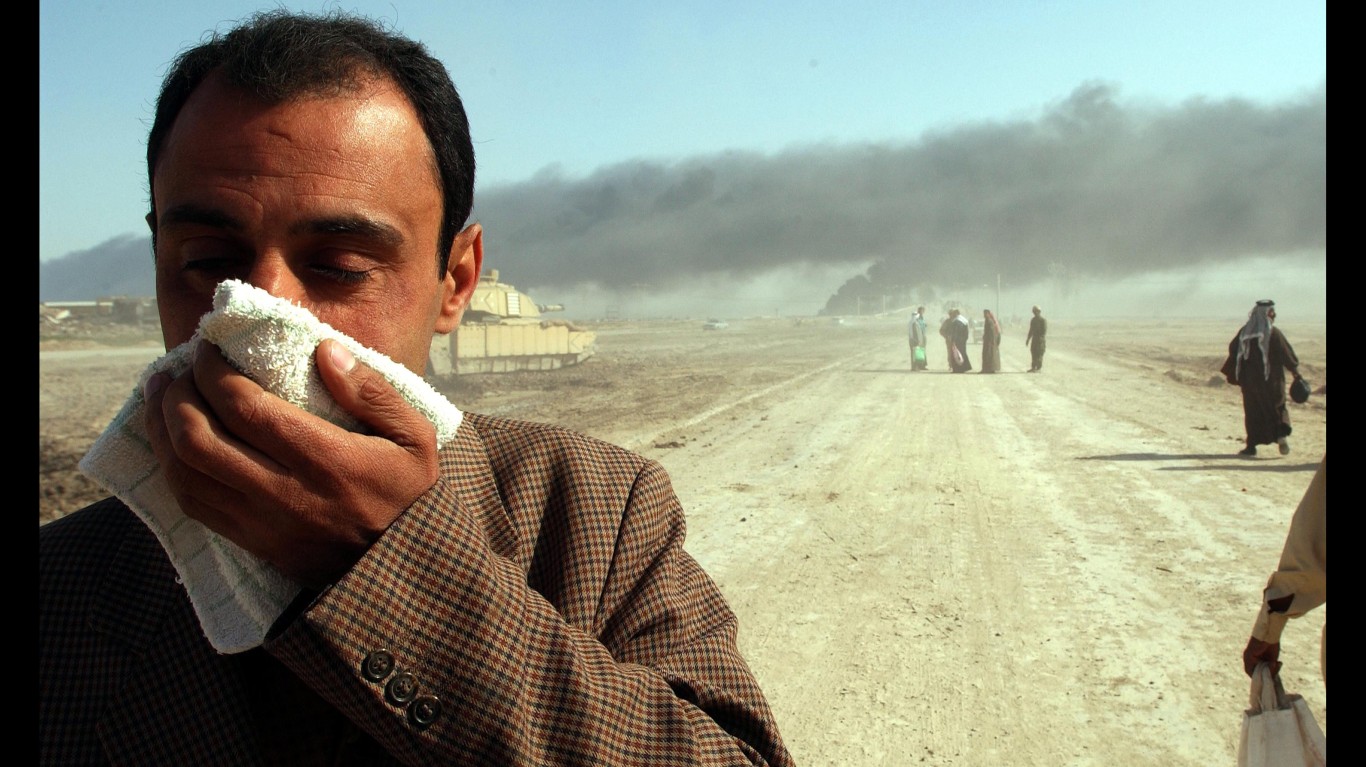
Oil up in flames
A man covers his nose and mouth to protect against smoke from oil fires burning near the entrance to the Ba’ath Party stronghold of Basra.
[in-text-ad-2]
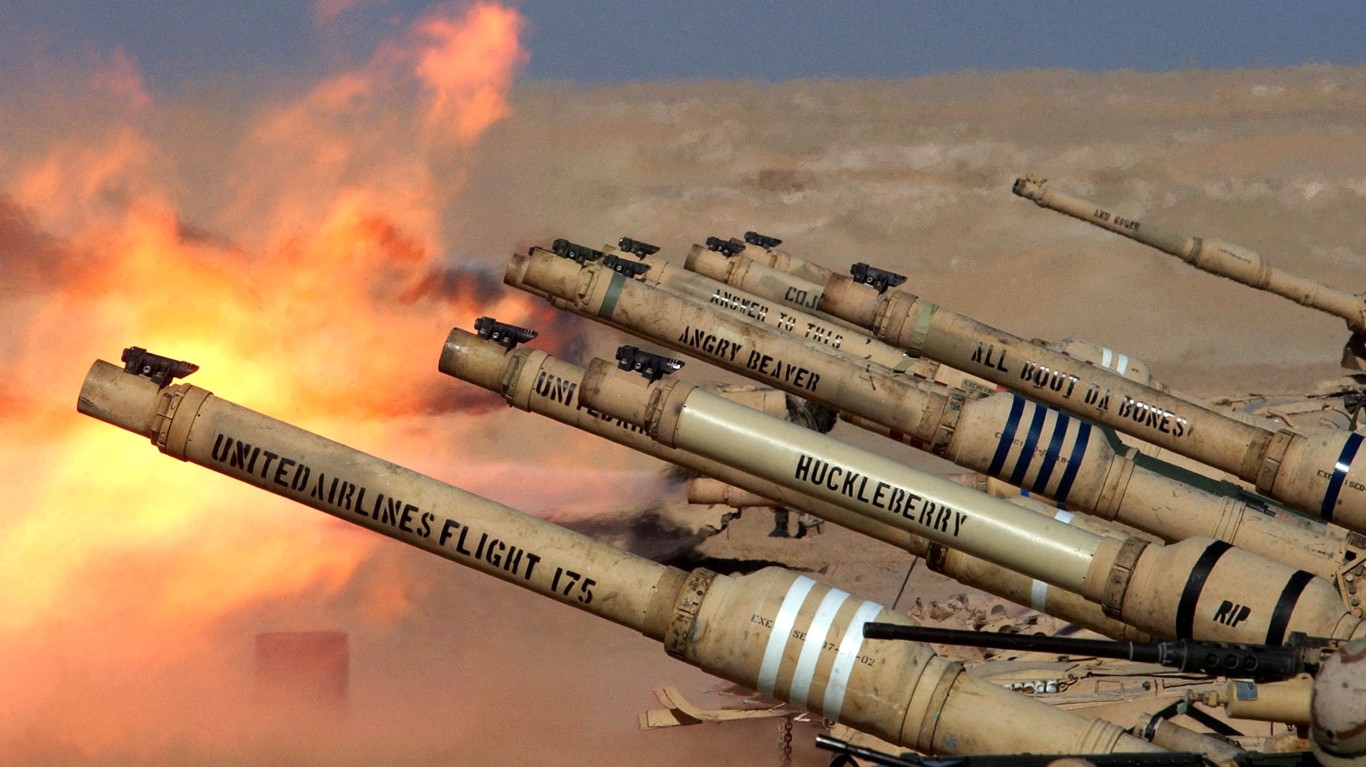
Training for the attack
U.S. Army M1/A1 Abrams tanks engage in a live-fire training session near the Iraqi border in northern Kuwait in preparation for the invasion.
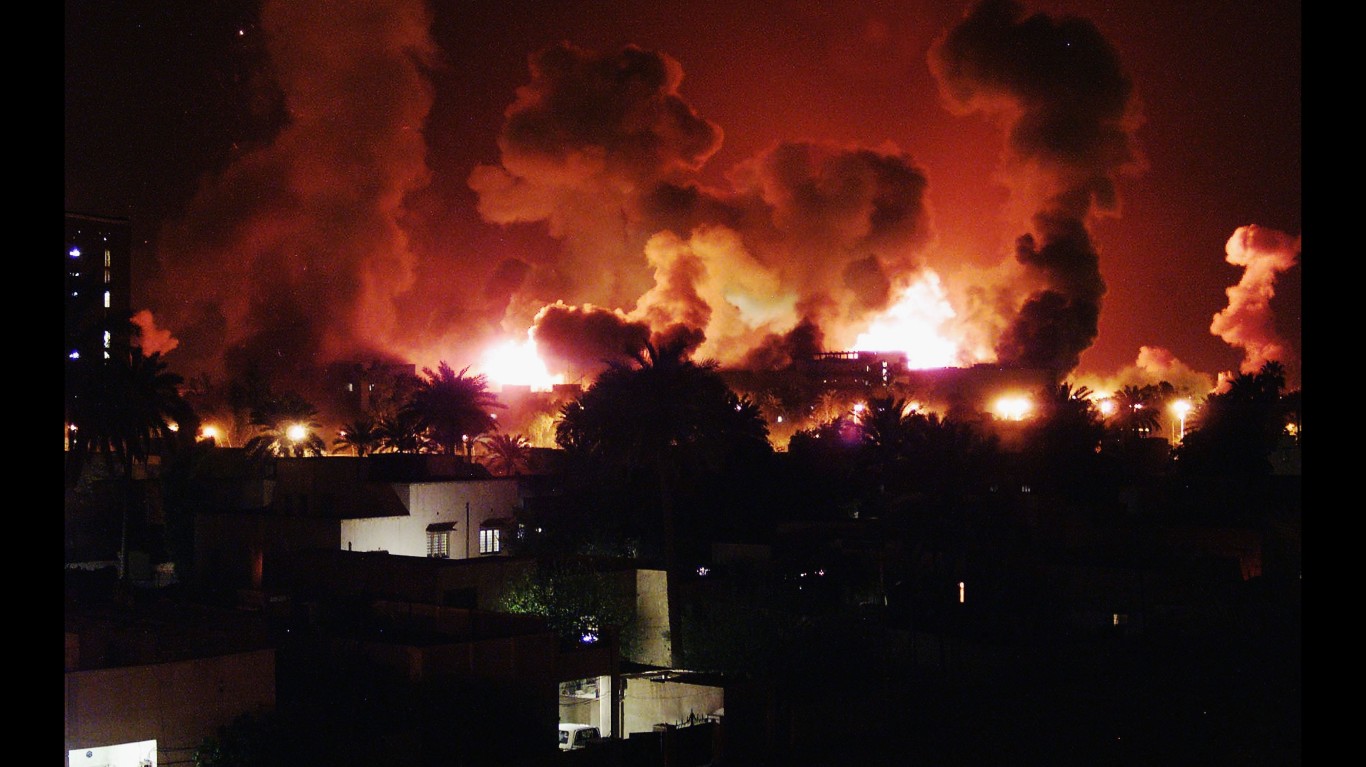
Shock and awe
Fires rage in Baghdad after massive bombing strikes during the optimistic but ultimately ineffective U.S. “shock and awe” air campaign.
[in-text-ad]
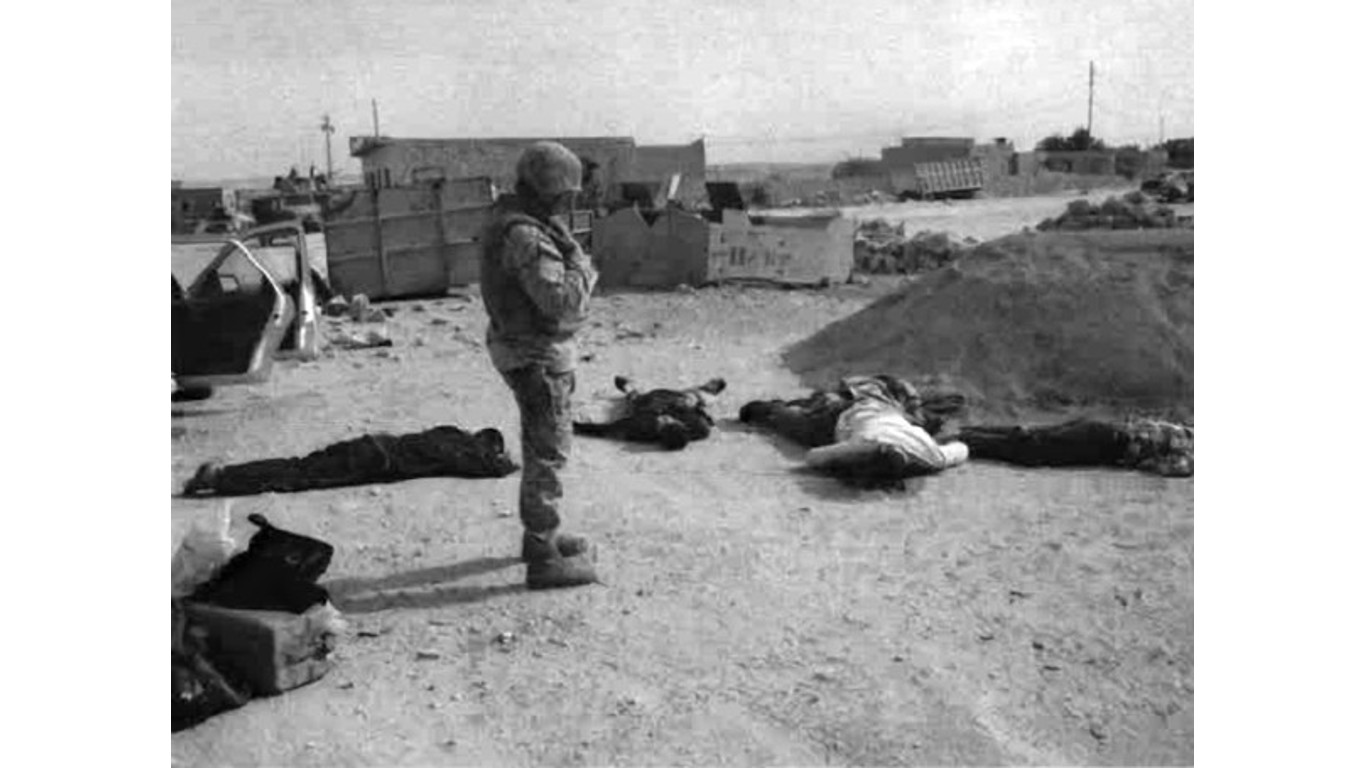
Murder in the midst of war
A U.S. Marine inspects the scene following the deaths of unarmed Iraqi civilians at Marine hands near Haditha, in northwestern Iraq, in 2005 – an episode that culminated with four Marines being charged with murder.
Automotive martyrdom
A car bomb exploded by a suicide bomber, possibly a member of al-Qaeda, leaves a crater and other mangled vehicles on a Baghdad street.
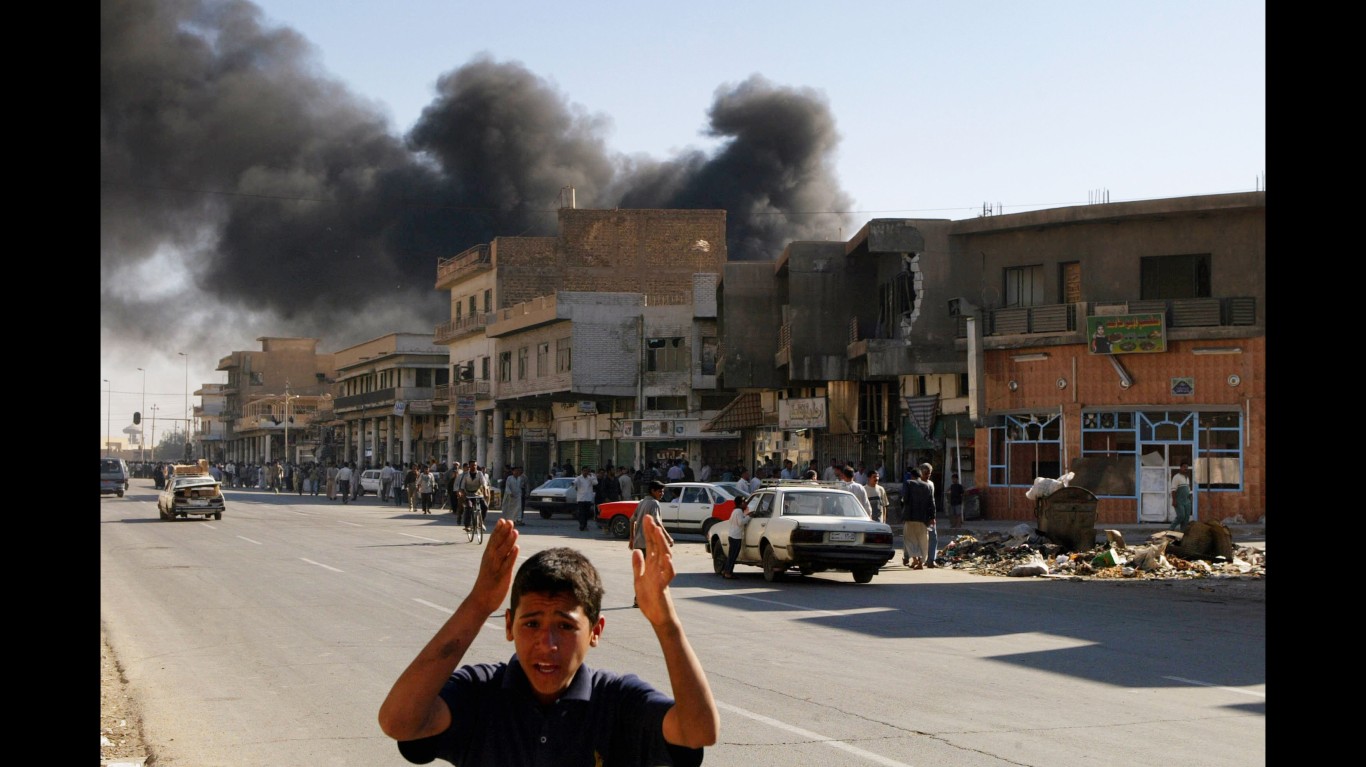
Throwing up his hands
A boy seems to be asking “Why is this going on” as a gas station fire, ignited by an explosion that killed at least three people, rages in the background.
[in-text-ad-2]
Hunting Americans
Two masked Iraqi insurgents, part of a group targeting American and other coalition troops, pose with their weapons.
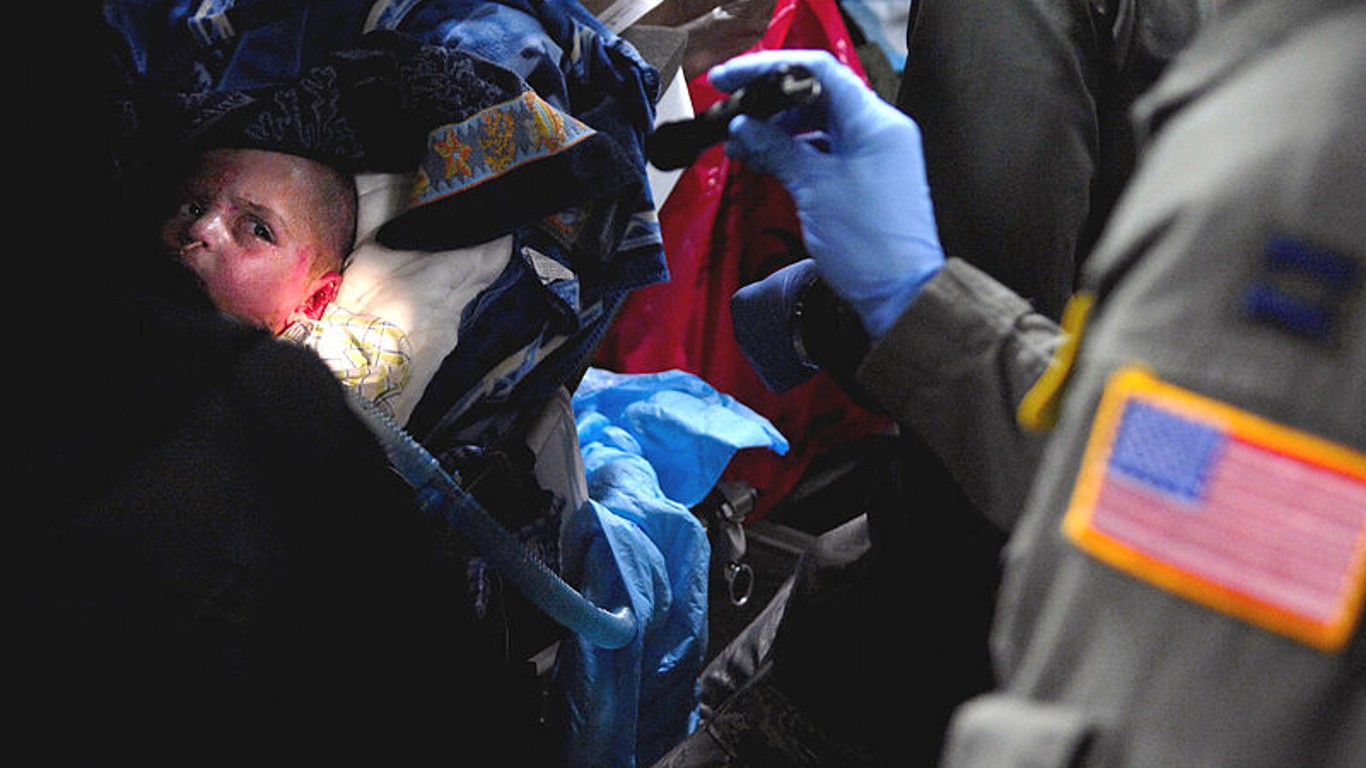
Treating a victim
A U.S. Air Force medic treats a 3-year-old Iraqi burn victim on a C-17 Globemaster III en route to the U.S., where the child will receive specialized care.
[in-text-ad]
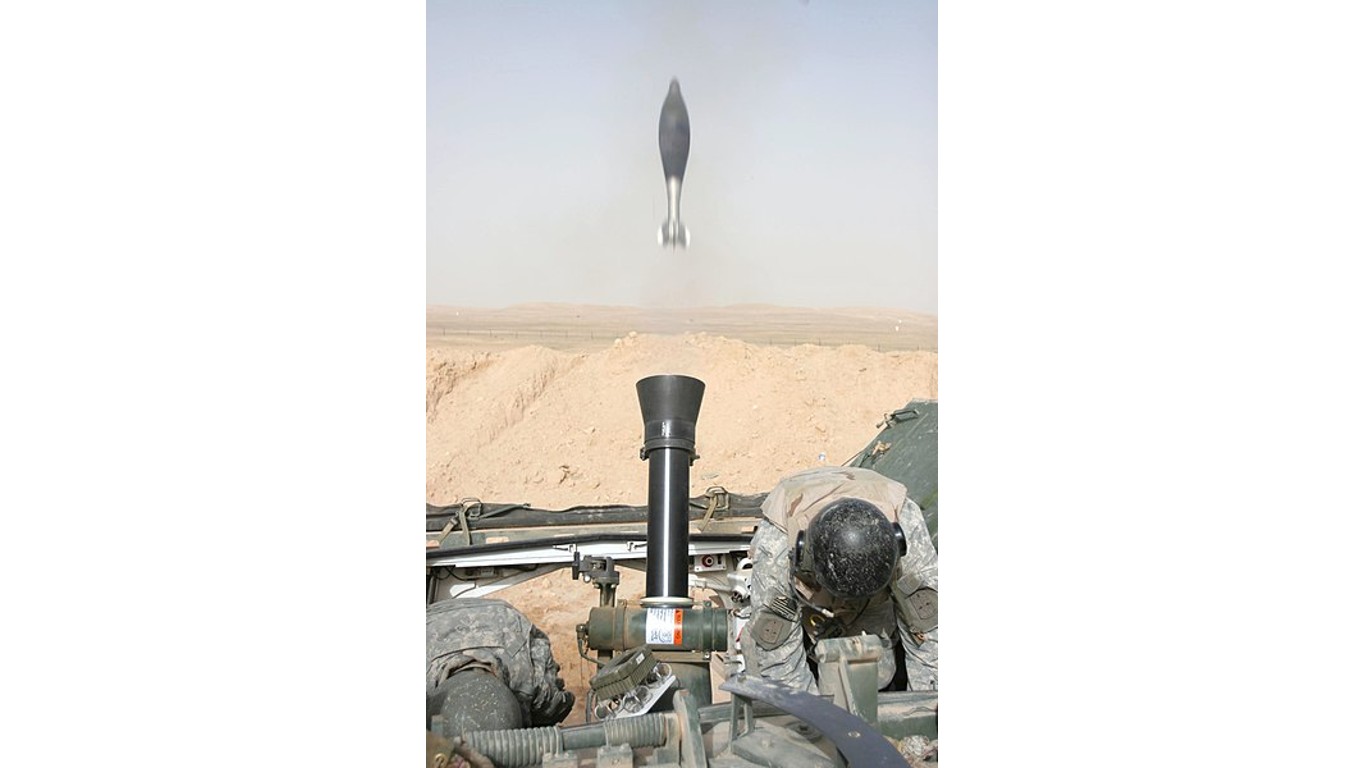
Destruction from the skies
Members of the 1st Marine Division fire a mortar from a Stryker combat vehicle in Al Anbar province in western Iraq.
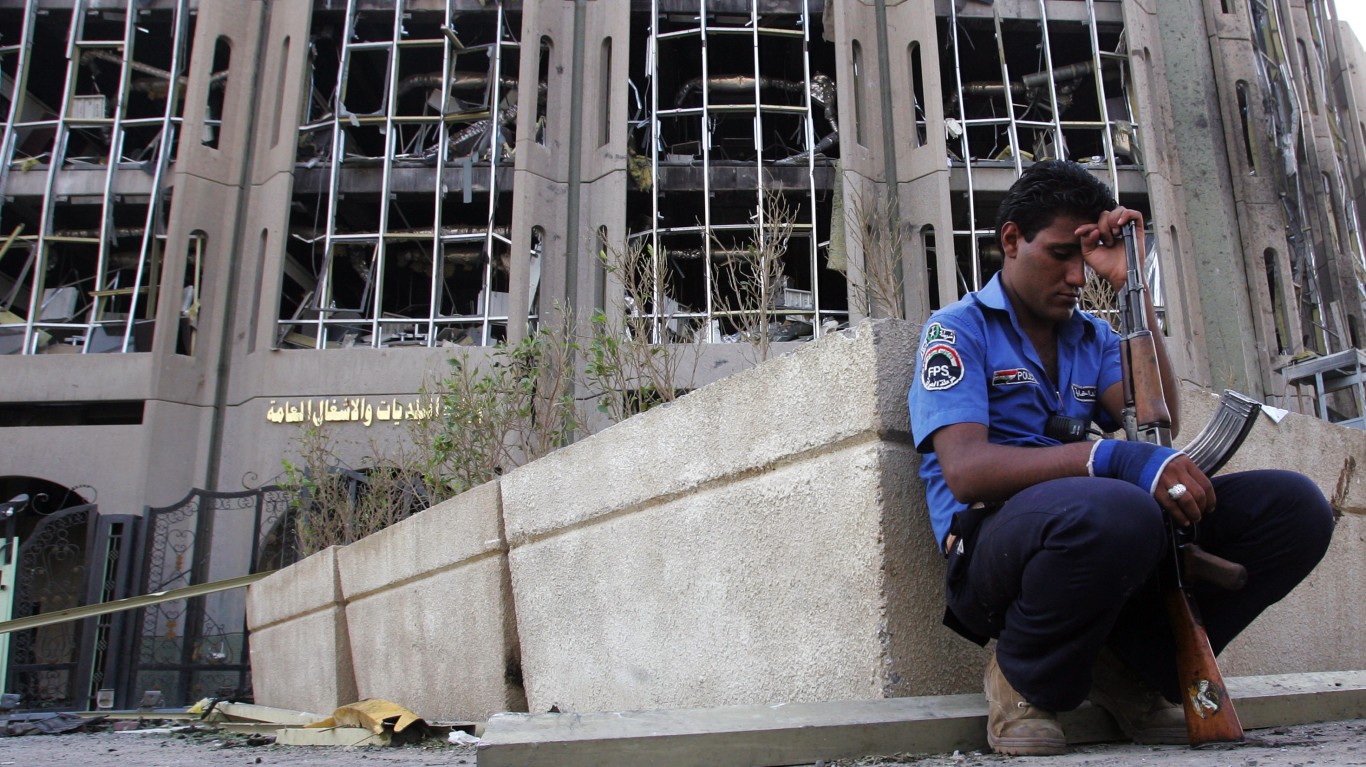
Car bomb devastation
An Iraqi policeman seems lost in thought outside the Ministry of Justice in Baghdad, site of one of two car bomb explosions the previous day, which killed more than 130 people in total.

Cleaning up the wreckage
A man attempts to clean up some of the damage caused by a car bomb explosion in which two people were killed in Baghdad’s Karrada neighborhood.
[in-text-ad-2]
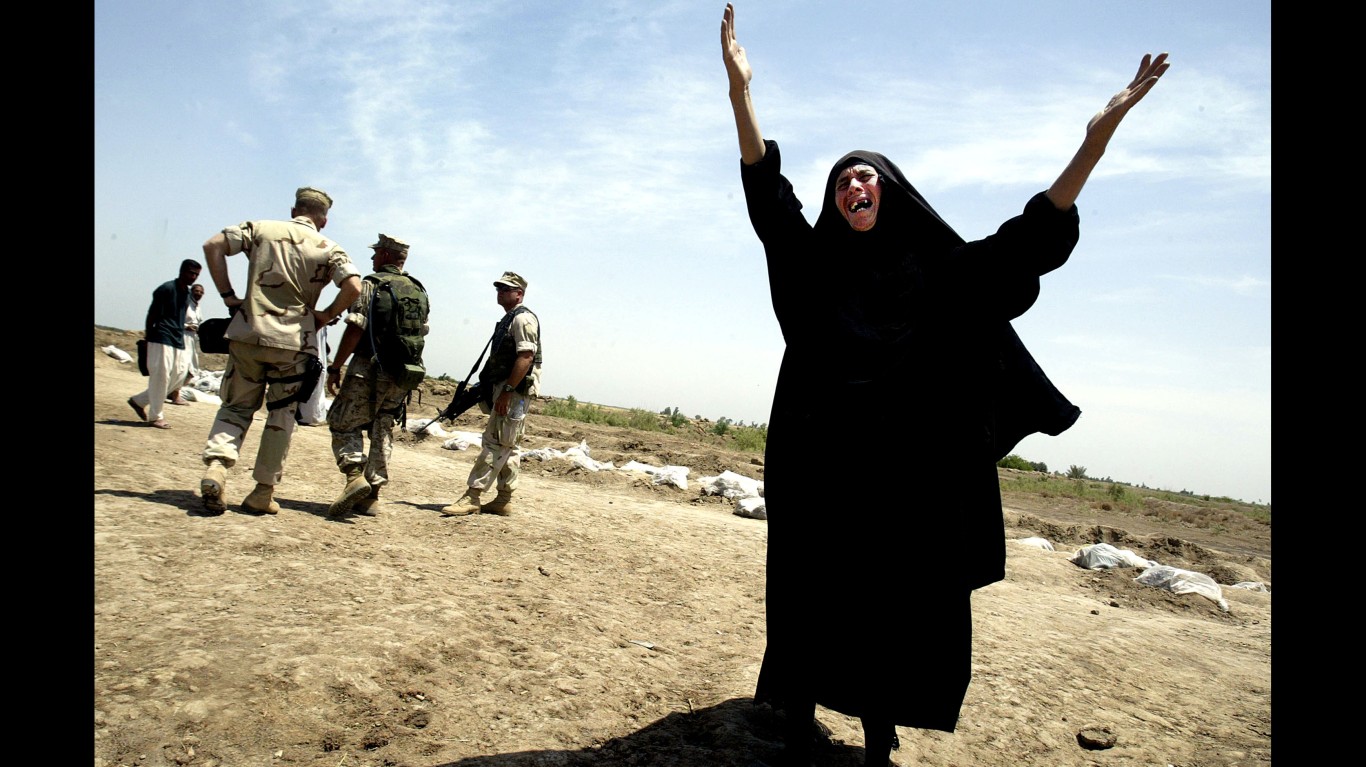
Mourning her son
A woman cries the name of her son to the heavens at the site of a mass grave at Hillah, south of Baghdad, discovered by coalition forces.
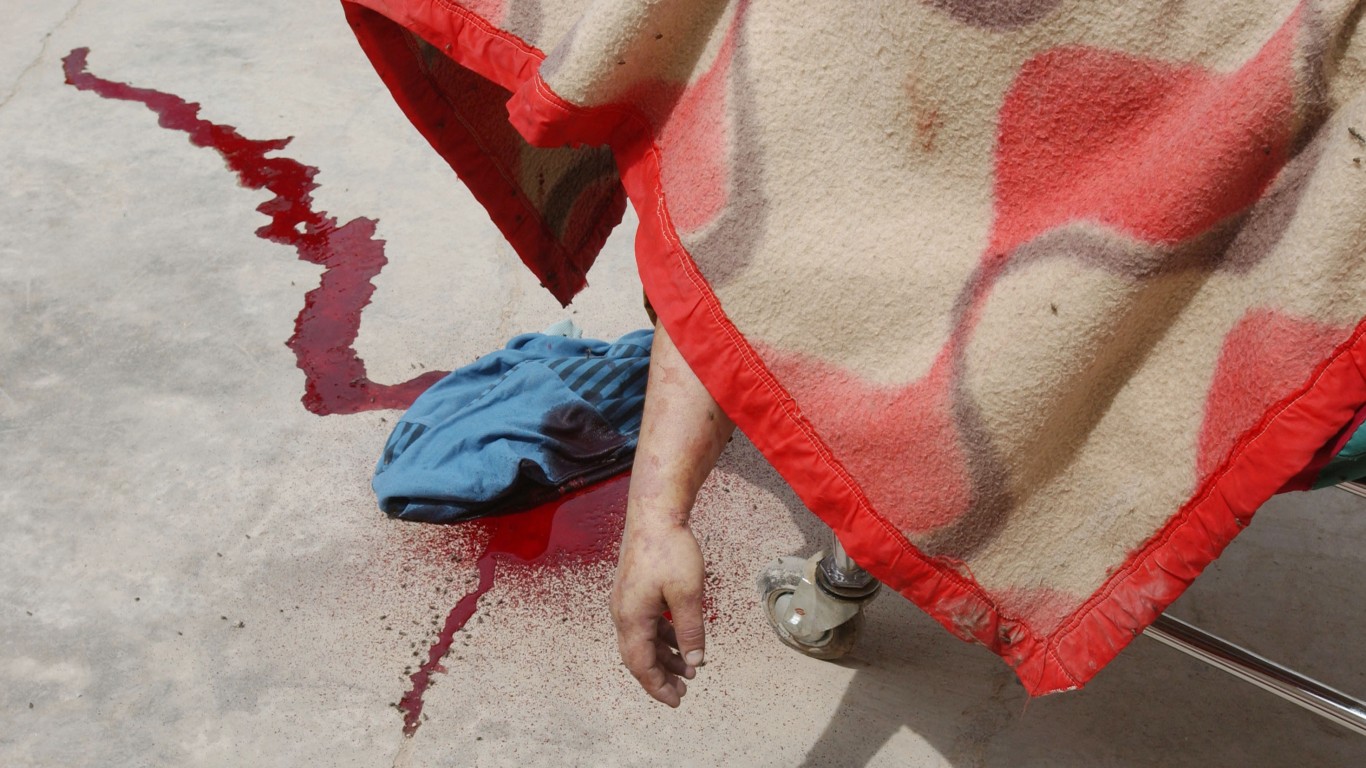
Shi’ite blood
At Baghdad’s Chavdar Saddam Hospital, blood runs from the body of a Shi’ite woman slain in a firefight between Shi’ites and pro-Hussain Fedayeen.
[in-text-ad]
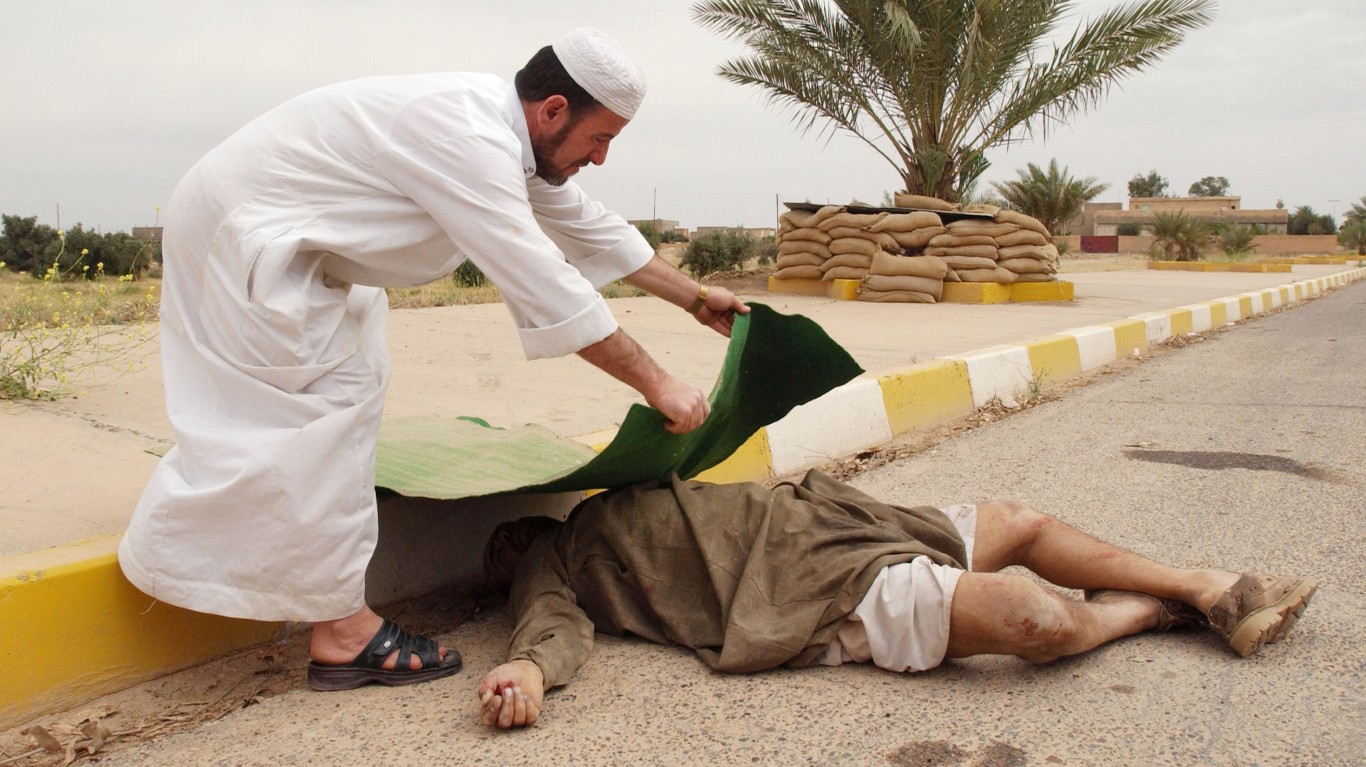
Respect for the dead
A passerby covers the body of a man killed on the road to Tikrit, north of Baghdad.
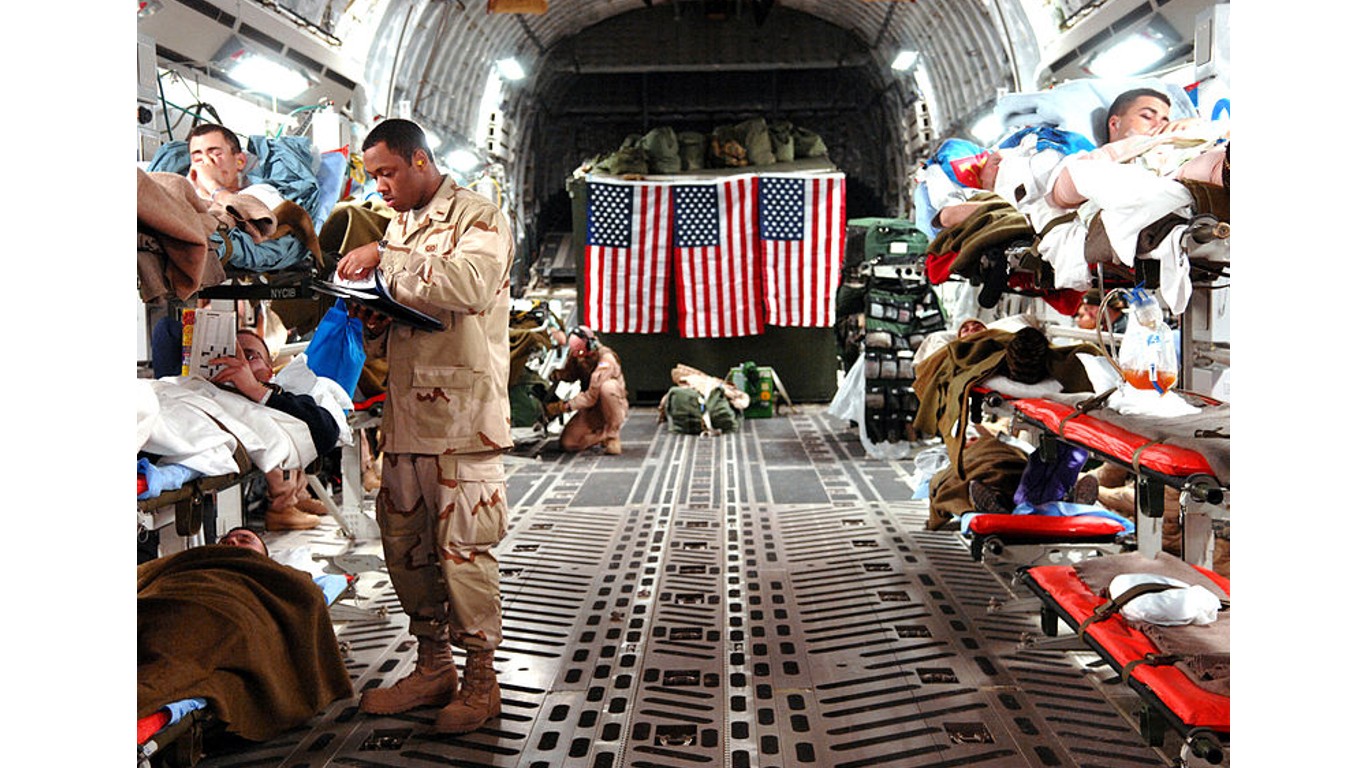
Flying towards recovery
Air Force medics tend to wounded Americans on a C-17 Globemaster III medical evacuation aircraft, heading from Balad Air Base in Iraq to Ramstein Air Base in Germany.
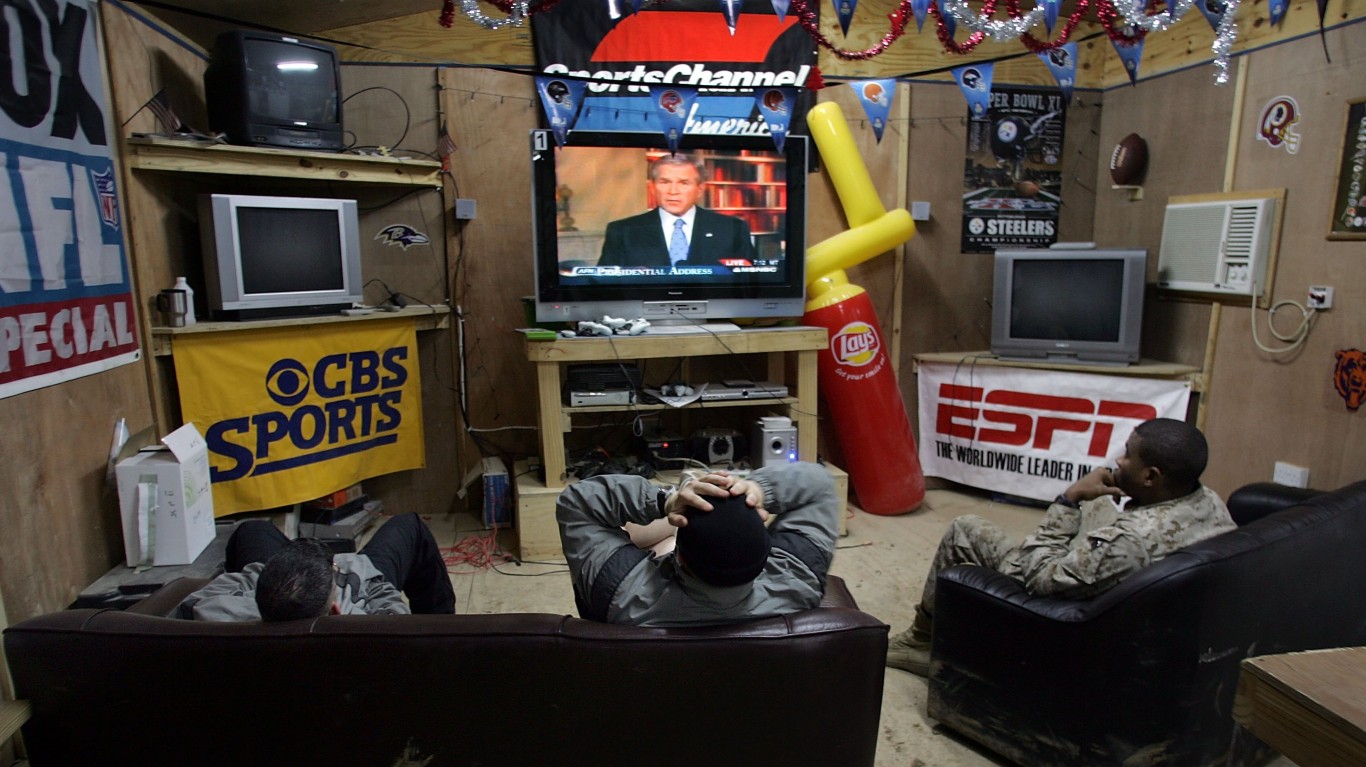
Watching the president
Officers watch a televised address by President Bush in January 2007 from their base at Camp Ramadi in Al Anbar province during which he announced a troop increase of 20,000 forces.
[in-text-ad-2]
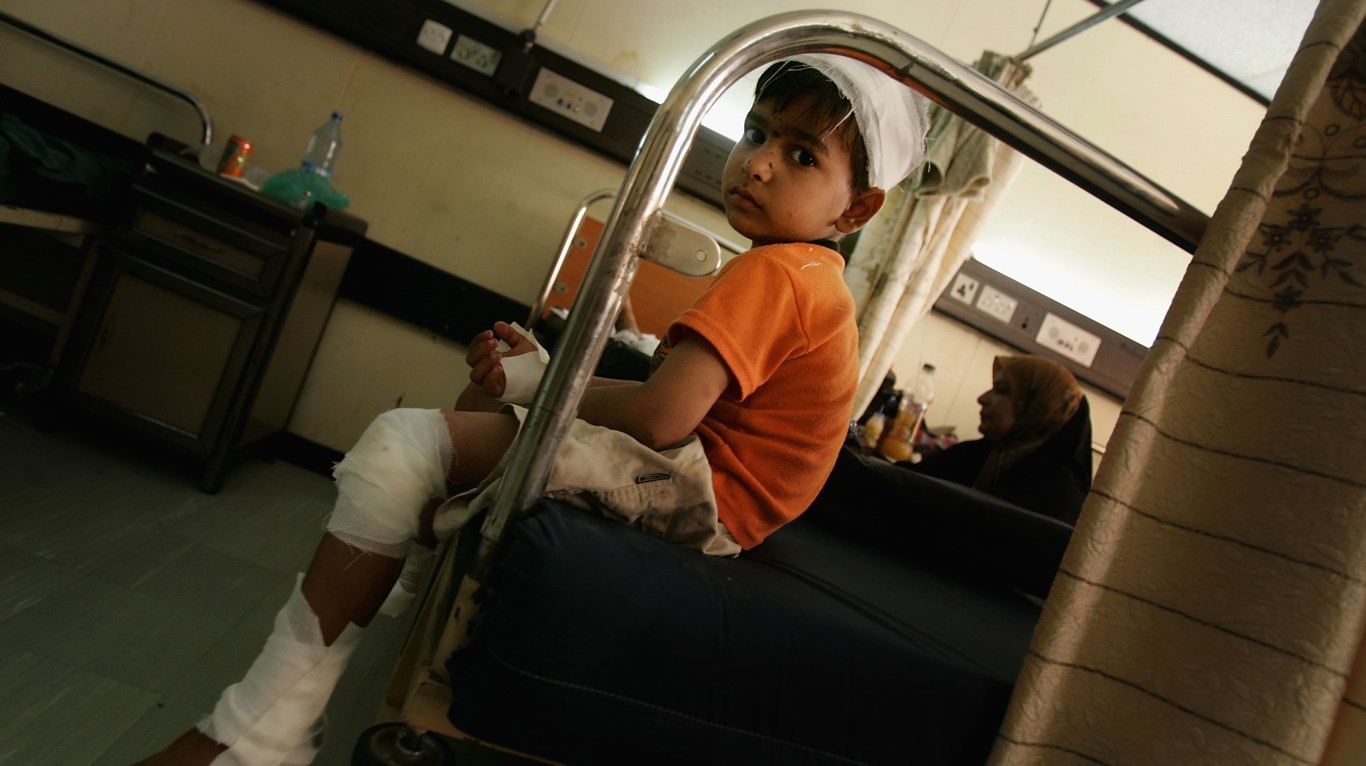
Car bomb survivor
An Iraqi boy sits in al-Kadhimiya Hospital in Baghdad after having been injured in a car bomb explosion in the al-Hurriyah neighborhood that claimed at least 51 lives.
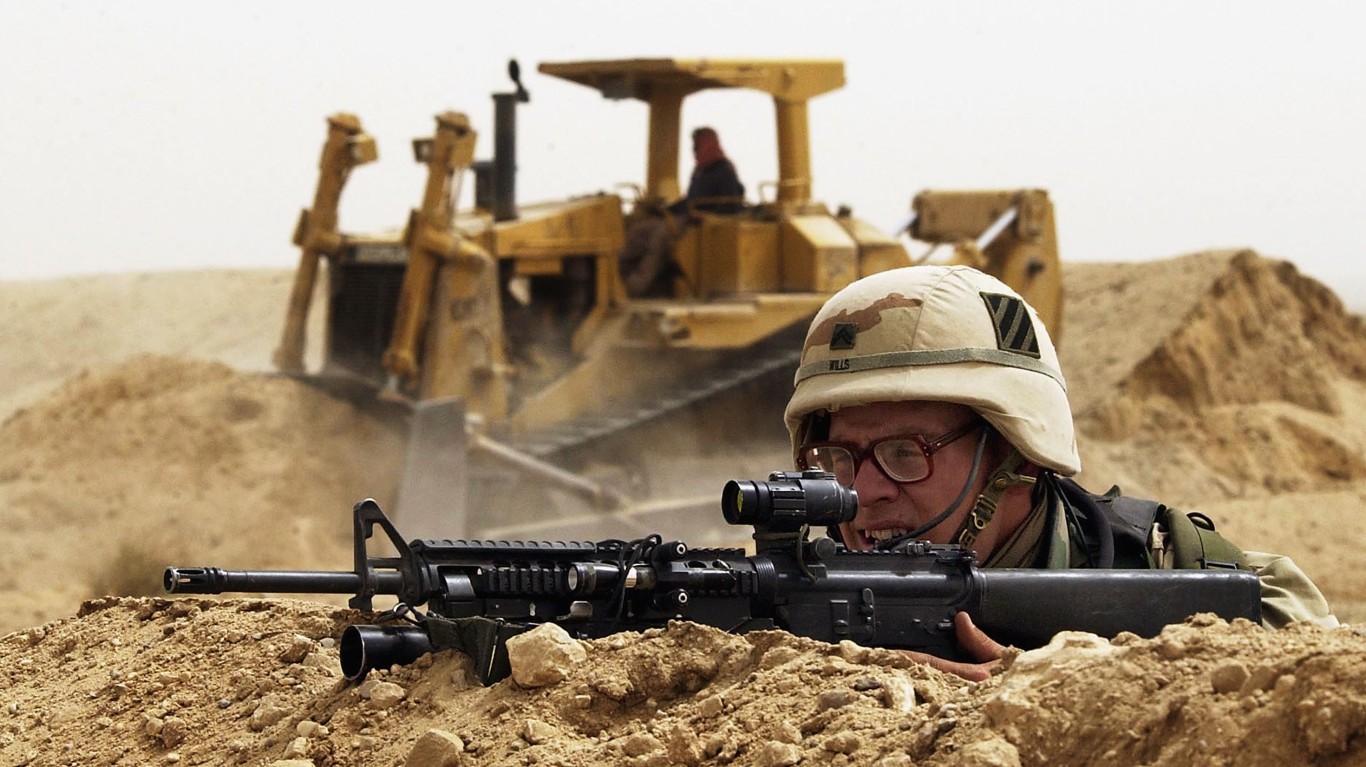
Preparing for the ground war
U.S. Army troops secure an abandoned United Nations position in Kuwait, 75 feet from the Iraqi border, in preparation for the land invasion, after the air war has already begun.
100 Million Americans Are Missing This Crucial Retirement Tool
The thought of burdening your family with a financial disaster is most Americans’ nightmare. However, recent studies show that over 100 million Americans still don’t have proper life insurance in the event they pass away.
Life insurance can bring peace of mind – ensuring your loved ones are safeguarded against unforeseen expenses and debts. With premiums often lower than expected and a variety of plans tailored to different life stages and health conditions, securing a policy is more accessible than ever.
A quick, no-obligation quote can provide valuable insight into what’s available and what might best suit your family’s needs. Life insurance is a simple step you can take today to help secure peace of mind for your loved ones tomorrow.
Click here to learn how to get a quote in just a few minutes.
Thank you for reading! Have some feedback for us?
Contact the 24/7 Wall St. editorial team.
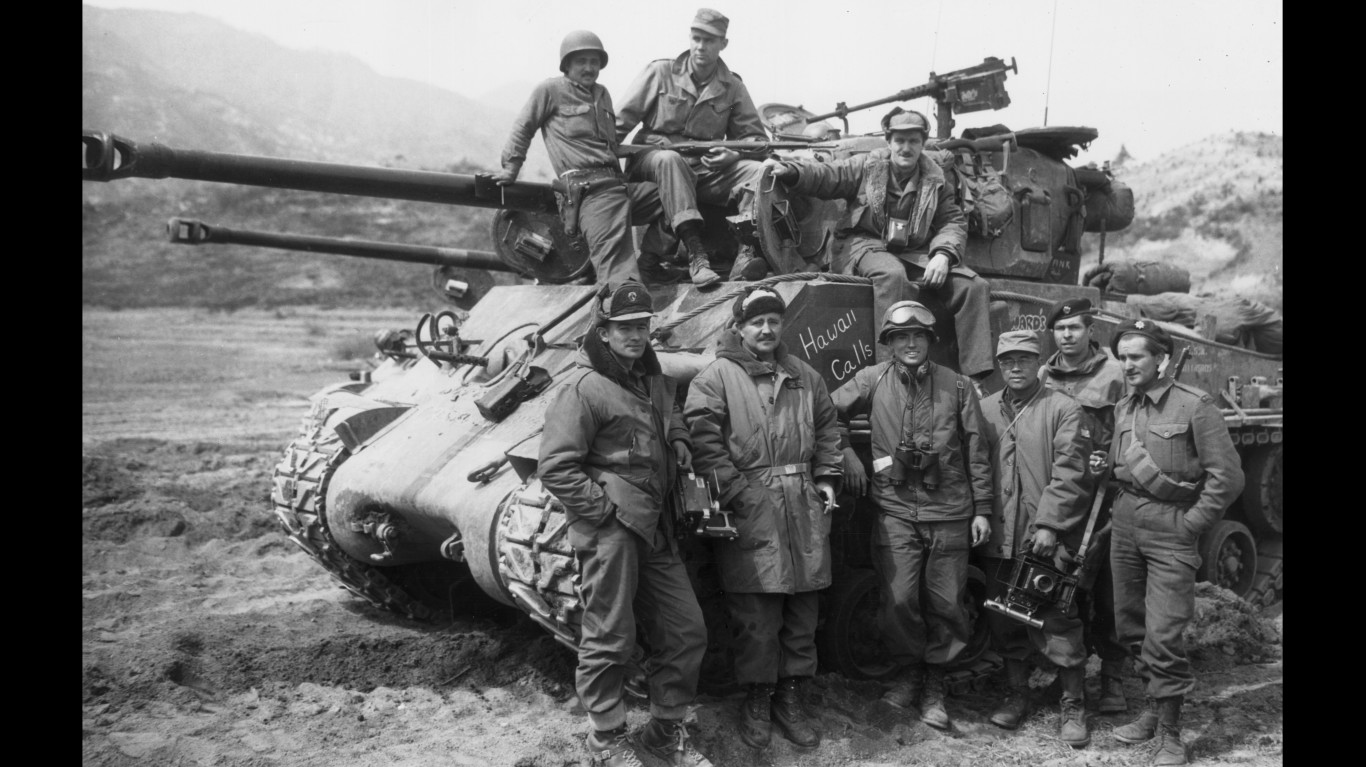 24/7 Wall St.
24/7 Wall St.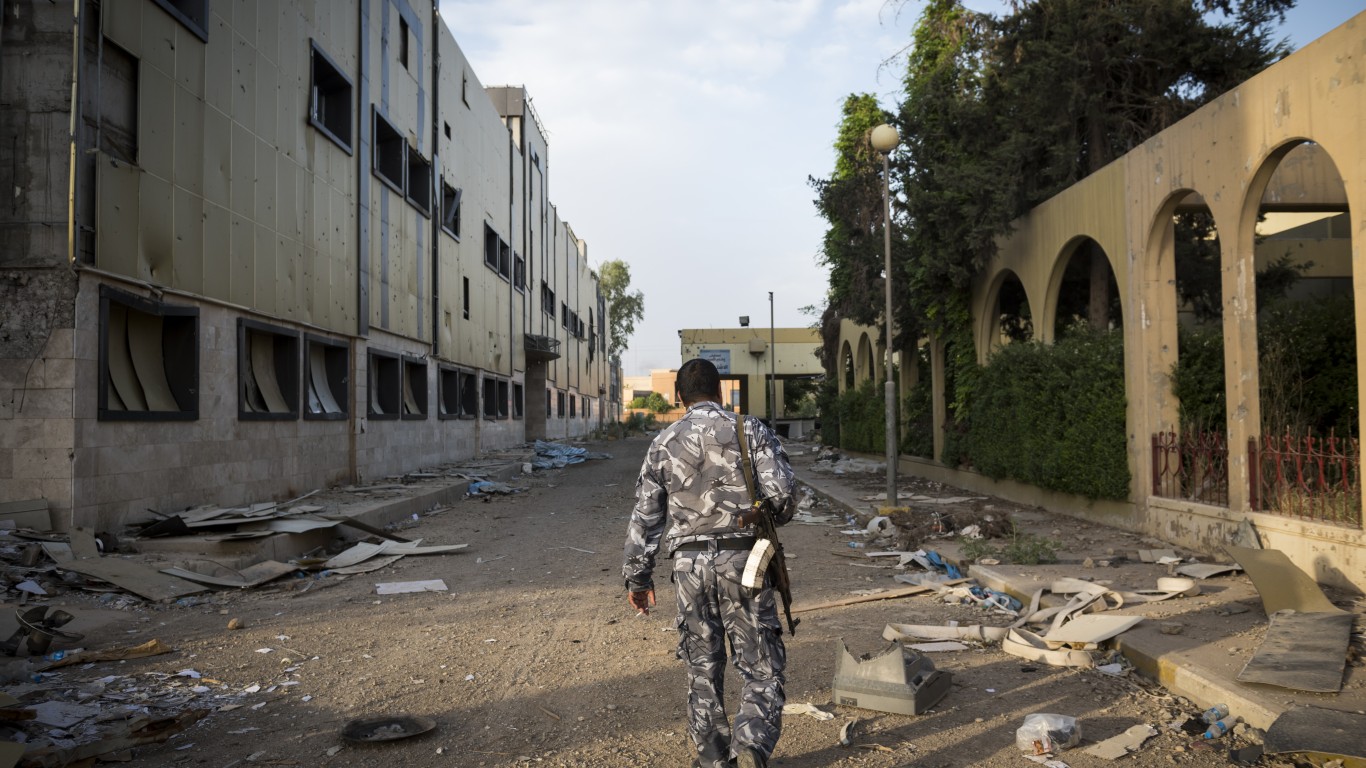 24/7 Wall St.
24/7 Wall St.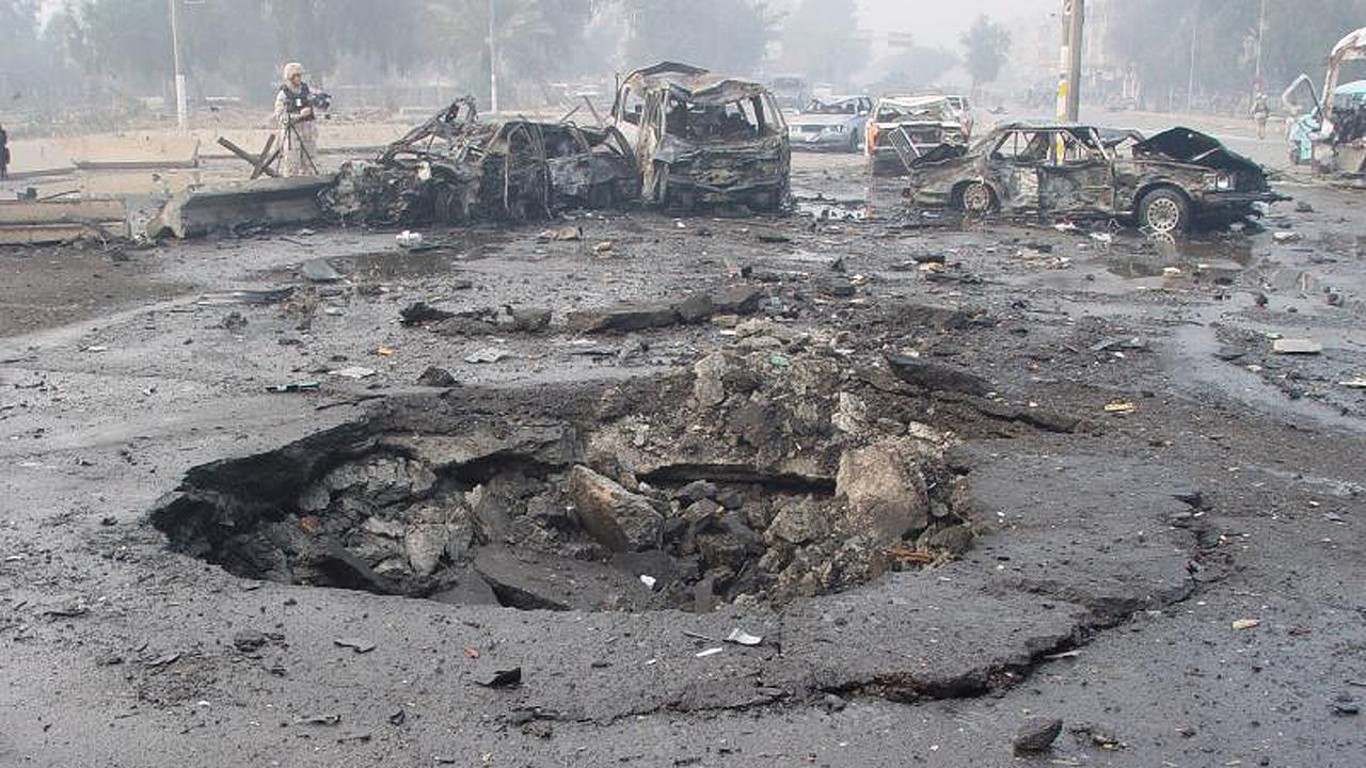
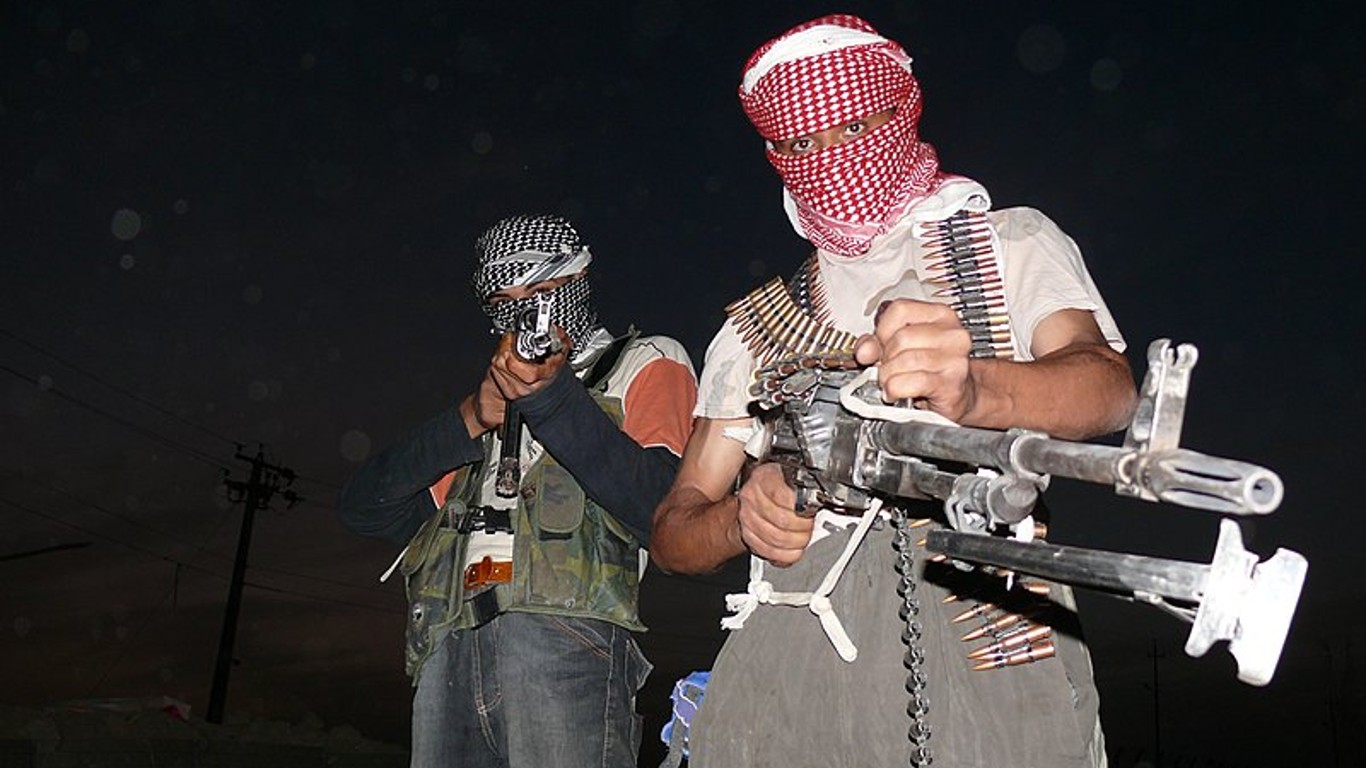
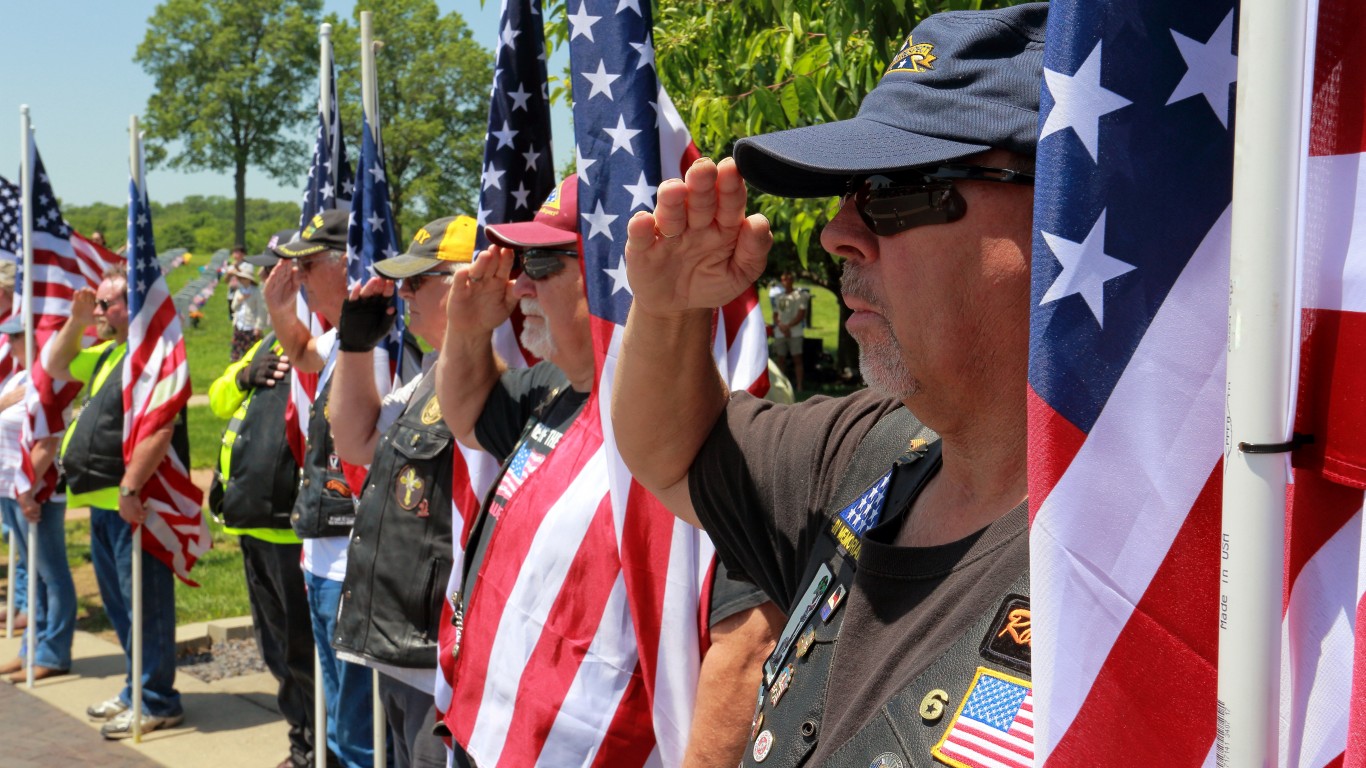 24/7 Wall St.
24/7 Wall St.